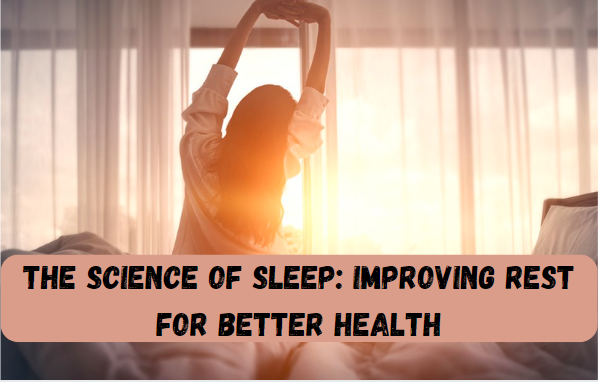Sleep is a fundamental aspect of human health and well-being, yet many people struggle to get enough quality rest. Understanding the science of sleep can help us appreciate its importance and guide us toward better sleep habits. This article explores the science behind sleep, its impact on health, and practical tips for improving sleep quality.
Contents
The Science Behind Sleep
Sleep Stages
Sleep is divided into several stages, each serving different functions and contributing to overall health. These stages include:
- NREM Sleep:
- Stage 1 (N1): This is the lightest stage of sleep, where you transition from wakefulness to sleep. It lasts only a few minutes and is characterized by slow eye movements and reduced muscle activity.
- Stage 2 (N2): During this stage, your heart rate slows, and your body temperature drops. Sleep spindles (bursts of brain activity) and K-complexes (high-amplitude brain waves) occur, which help protect and consolidate memories.
- Stage 3 (N3): Also known as deep or slow-wave sleep, this stage is crucial for physical restoration and immune function. It is characterized by slow delta brain waves and is difficult to awaken from.
- REM Sleep:
- Rapid Eye Movement (REM): REM sleep occurs about 90 minutes after falling asleep and is characterized by rapid eye movements, vivid dreams, and increased brain activity. It plays a vital role in cognitive functions such as learning, memory consolidation, and emotional regulation.
Circadian Rhythms
Circadian rhythms are internal biological processes that regulate the sleep-wake cycle over a 24-hour period. They are influenced by environmental cues such as light and darkness and help synchronize sleep patterns with the day-night cycle. Disruptions to circadian rhythms, such as shift work or jet lag, can negatively impact sleep quality and overall health.
The Impact of Sleep on Health
Adequate sleep is essential for various aspects of health and well-being:
Physical Health
- Immune Function: Quality sleep strengthens the immune system, helping the body fight off infections and diseases.
- Cardiovascular Health: Poor sleep is linked to increased risk of hypertension, heart disease, and stroke.
- Metabolism and Weight: Sleep deprivation can disrupt metabolic processes, leading to weight gain and increased risk of obesity and diabetes.
Mental Health
- Cognitive Function: Sleep plays a critical role in memory consolidation, learning, and problem-solving skills. Chronic sleep deprivation can impair cognitive performance and decision-making.
- Emotional Regulation: Adequate sleep helps regulate mood and reduces the risk of mental health issues such as depression and anxiety.
Performance and Safety
- Physical Performance: Athletes and active individuals benefit from quality sleep, which enhances physical performance, muscle recovery, and overall endurance.
- Safety: Sleep deprivation impairs reaction times and cognitive function, increasing the risk of accidents and errors in daily activities.
Tips for Improving Sleep Quality
Improving sleep quality involves creating a conducive sleep environment and adopting healthy sleep habits. Here are some practical tips:
Establish a Consistent Sleep Schedule
- Regular Sleep Times: Go to bed and wake up at the same time every day, even on weekends, to regulate your circadian rhythm.
- Gradual Adjustments: Make gradual changes to your sleep schedule if needed, aiming for a 15-30 minute adjustment per day.
Create a Relaxing Bedtime Routine
- Wind Down: Engage in calming activities before bed, such as reading, taking a warm bath, or practicing relaxation techniques.
- Limit Stimulants: Avoid caffeine, nicotine, and heavy meals close to bedtime, as these can interfere with sleep.
Optimize Your Sleep Environment
- Comfortable Bedding: Invest in a comfortable mattress and pillows that support restful sleep.
- Temperature and Lighting: Keep the bedroom cool, dark, and quiet. Use blackout curtains, earplugs, or white noise machines if needed.
- Electronic Devices: Limit screen time before bed and use blue light filters on devices to reduce the impact of artificial light on sleep.
Manage Stress and Anxiety
- Mindfulness and Relaxation: Practice mindfulness, meditation, or deep breathing exercises to manage stress and promote relaxation.
- Journaling: Write down your thoughts and concerns before bed to clear your mind and reduce anxiety.
Exercise Regularly
- Physical Activity: Engage in regular physical activity, such as walking, jogging, or yoga, to improve sleep quality. However, avoid vigorous exercise close to bedtime, as it may interfere with falling asleep.
Seek Professional Help if Needed
- Sleep Disorders: If you experience persistent sleep problems, such as insomnia, sleep apnea, or restless leg syndrome, consult a healthcare professional or sleep specialist for evaluation and treatment.
Conclusion
Understanding the science of sleep highlights its crucial role in maintaining overall health and well-being. By establishing a consistent sleep schedule, creating a relaxing bedtime routine, optimizing the sleep environment, managing stress, and incorporating regular exercise, individuals can significantly improve sleep quality and enjoy the benefits of restful, restorative sleep. Prioritizing sleep as a fundamental aspect of health can lead to enhanced physical health, mental clarity, and overall quality of life.
























+ There are no comments
Add yours